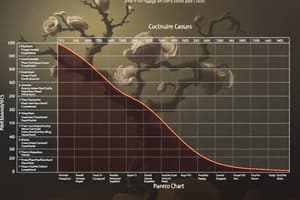Podcast
Questions and Answers
Why is it important to learn project management?
Why is it important to learn project management?
To manage work packages, execute larger projects, understand processes, and apply concepts in daily life.
What defines a project?
What defines a project?
A temporary endeavor designed to produce a unique product, service, or result with defined beginning and end.
Which of the following is NOT considered a project?
Which of the following is NOT considered a project?
- Repeatable tasks (correct)
- Explorations (correct)
- One-off events
- New product development
What are the primary constraints in project management?
What are the primary constraints in project management?
A project is something that can go on indefinitely.
A project is something that can go on indefinitely.
What is project management?
What is project management?
Flashcards are hidden until you start studying
Study Notes
About Dr. Uğur Murat Leloğlu
- PhD in Electrical Engineering from Middle East Technical University (METU), completed in 2001
- Researcher at École Nationale Supérieure des Télécommunications (1997-1998)
- Worked at Surrey Space Center and SSTL, Surrey University (2001-2002)
- Served as Institute Director at TÜBİTAK's Space Technologies Research Institute (2004-2011)
- Academic staff at METU’s GGIT (2013-2022) and currently at THKÜ (2022-present)
- Expertise in image processing, computer vision, remote sensing, and spacecraft system design
Importance of Learning Project Management (PM)
- Participation in professional work will invariably involve working on projects
- Individuals will need to manage specific work packages and potentially larger projects over time
- Understanding PM is crucial to avoid being blamed for failures and to comprehend project dynamics
- PM concepts are applicable and beneficial in everyday life scenarios
Definition of a Project
- Temporary endeavor with a unique product, service, or result
- Defined beginning and end, often constrained by time, funding, or deliverables
- Aimed at achieving specific goals and beneficial change
- Includes a customer, scheduled timeline, defined resources, and budget
- Outcomes and project name must be well defined
Characteristics of Non-Projects
- Exploratory activities without defined end
- Continuous operations or endless tasks
- Efforts by a single team or individual without cooperation
- Repetitive tasks producing the same outcomes
- No constraints on time, cost, or performance
Differentiating Daily Routine Jobs from Projects
- Routine jobs are repetitive, continuous, and based on known processes
- Projects are unique, done once, marked by ambiguity and little past experience
- Example contrast: Student registration (routine) vs EE 494 projects (a project)
Historical Context of Project Management
- Projects date back to historical periods as early as the 27th Century BC, evolving into modern practices.
Definition and Components of Project Management
- PM involves the disciplines of initiating, planning, executing, controlling, and closing team efforts for specific objectives
- Key constraints include scope, time, quality, and budget
- Program management oversees multiple related projects to enhance organizational performance
Studying That Suits You
Use AI to generate personalized quizzes and flashcards to suit your learning preferences.




